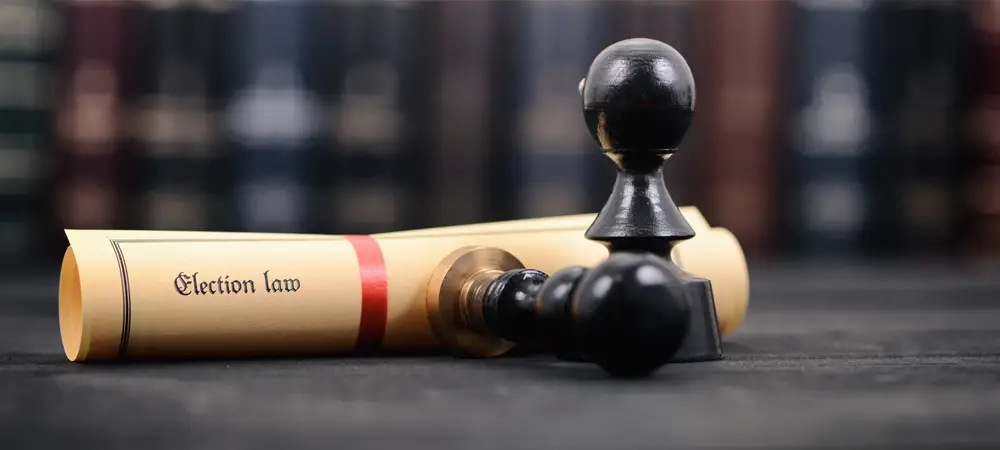India’s Election Laws: A Democratic Enforcement


The idea of Election is the cornerstone of a democratic governance, with the right to freely vote being paramount. The electoral system in India is designed such that every citizen is able to cast his/her vote without any coercion or intimidation. This article examines the laws governing elections in India, which highlight forbidden activities as well as legislative reforms and mechanisms for ensuring free and fair voting.
Aim of Election Laws
Election is a political process and predominant aim of election laws is meant to maintain political freedom and equalities. This is a subject niche where only specialized designed curricula of Law School have their hands on. One of the leading law schools in Delhi-NCR-Gurgaon region The NorthCap University is one worth mentioning. Democratic governments hinge on free and fair elections so that citizens can choose leaders without undue manipulation or intimidation. These legislations seek to protect the sanctity of polls while promoting conductance of election processes that reflect the true people’s wishes.
Indian elections are important because they determine where we are headed as a nation. Every individual’s vote can change who runs our country. To safeguard this democratic right, no prejudiced ideas should be allowed into the election process whether political, religious, or social prejudices exist there. Also, as the years pass down, the ideologies evolve and so do the need to communicate it further which would be possible only if the representatives are well sought after. Universal suffrage and the absence of coercion in candidate selection are the primary distinguishing attributes of democratic elections. The Election Commission of India (ECI) conducts elections in a manner that guarantees they are free, fair, and transparently done as stipulated under Article 324 of the Indian constitution.
Historical Background
The first time ever electorate related rules came on the forefront was the Government of India Act of 1919, which served the first piece of legislation aimed at combating voting malpractices. The Indian Election Offence and Enquiry Act of 1920 later made revisions to the Indian Penal Code to address election crimes. The most major legal move in this respect remains the Representation of the People Act of 1951, which thoroughly aimed to combat election fraud and corruption, setting the path for the current administration. Recently the new criminal law amendments in the nation is yet another step towards the macro objective of election laws.
Understanding Free and Fair Elections
“Free” and “fair” imply that there should be no enslavement or compulsion on voters. Voters should be allowed to exercise their rights freely, without being affected by party discipline, religion, casteism, sexism, linguism, or unethical activities such as bribery during campaigns or purchasing votes through money-based policies during elections.
The legal framework differentiates between corrupt activities and electoral crimes. Bribery, undue influence, and other behaviours that threaten election integrity are all examples of corrupt practices, according to Section 123 of the Representation of the People Act of 1951. Electoral offences, on the other hand, are criminal actions as specified in Chapter IXA of the Indian Penal Code (IPC), and they apply to all elections held by Indian electoral authorities.
Corrupt practices.
Corrupt practices are behaviours that directly influence the outcome of an election. For example, if a candidate uses bribery or undue influence to acquire votes, it distorts the democratic process and may result in the election being deemed invalid.
Such practices not only violate the ethical standards of elections but also have severe legal repercussions.
Electoral offences are criminal acts that can be prosecuted under the IPC. These include acts like impersonation, fraudulent voting, and tampering with election results. Unlike corrupt practices, electoral offences can be prosecuted immediately following the commission of the crime, ensuring prompt legal action.
Case Law: S. B. Adityan vs. S. Kandaswami and Others
In this case, the court ruled that the term “gratification” is wide enough to encompass conduct such as a candidate withdrawing his nomination to induce another to contest in an election. Such conduct is considered corrupt under Section 123.
Case Law: Jujhar Singh v. Bhairon Lall & Others
The Election Tribunal in this case held that even mental coercion may amount to undue influence if it takes away voter’s free will from exercising their choice.
The understanding of this subject area can only be effective if the case study format is used. The School of Law, The NorthCap University, ensures that very diligently throughout its rigorous tutorial sessions
Other electoral offences include impersonation, fraudulent voting, tampering with election results etc., which are addressed in various sections of IPC and Representation of People Act with stringent punishment provisions. India’s electoral laws have been strengthened through numerous reforms over the years. These reforms are intended for improving transparency, accountability and fairness in the electoral process. Some of them are as follows:
Voter Verified Paper Audit Trail (VVPAT): This is meant for ensuring transparent elections.
Limiting Election Expenditure: This is aimed at preventing undue influence using financial means.
Stricter Penalties for Electoral Offences: On top of increasing punishments for these offences so as to discourage them.
The goal of India’s election laws is to protect the democratic ideals of free and fair elections. These rules make guarantee that the election process represents the genuine desire of the people by prohibiting corrupt activities and electoral offences. For India’s democracy to remain intact, there must be strict adherence to the law and ongoing changes. It is critical for candidates, political parties, and voters to comprehend and abide by election regulations. India maintains the integrity of its democratic underpinnings by defending the election process and guaranteeing that the voice of every person is heard and respected.














